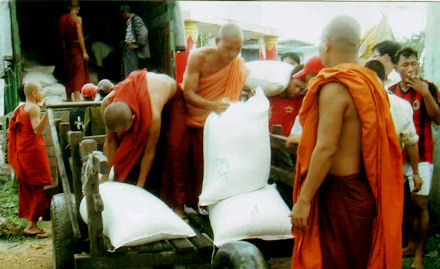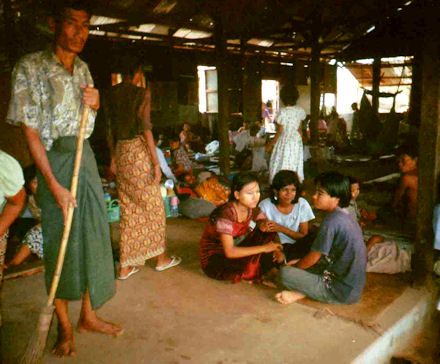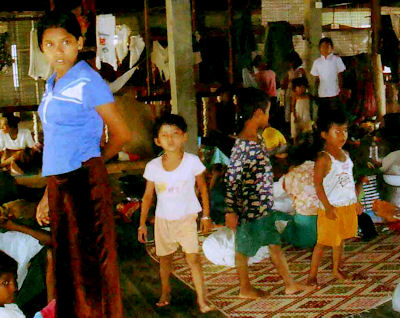Posted May 29, 2008
by Marc Johnson
Media reports have neglected the most important source of aid to victims of cyclone Nargis – spontaneous donations from their fellow citizens.
With the Burmese regime continuing to deny the true extent of the catastrophe, and army factions vying to appropriate as much of the aid as possible, food, clothing and money gifts from private Burmese citizens probably represents over 80% of the aid actually received by victims of the cyclone, which killed over 30,000 people when it hit southern Burma on May 2nd, with a similar number thought to have since died of injury, sickness, hunger and exhaustion.

A large amount of foreign aid is blocked at Burma?s borders, because western countries insist that their own development charities supervise its distribution, rather than Burmese troops, as the regime proposes. But, though you wouldn?t know it if you depend on the western media for your news, aid from Europe and North America is only ever a small part of the total resources deployed in response to any natural or man-made disaster. In Burma, as elsewhere, western aid is often an expensive and clumsy system, which ignores local traditions of philanthropic and social activism, and can even distort them, with its sudden inflow of easy money and impatient, arrogant ?experts?.
Fortunately, while (or perhaps because) Burma has an unspeakably bad government, its people have maintained a very strong tradition of social and cultural solidarity. The regime initially tried to confiscate spontaneous local aid for cyclone victims, placing roadblocks at the gates of Rangoon to intercept the hundreds of cars carrying food, clothing and money down into the delta region. But in the face of massive public anger ? and a wave of solidarity that was in any case able to find inventive ways past whatever physical and administrative blocks the regime created, the junta backed down at the end of last week.

The result was felt immediately. On Sunday 11 May, the roads from Rangoon down towards the first delta ports were virtual solid columns of cars. With most offices and workshops closed on that day, families, groups of friends and companies pooled their resources to provide aid, well aware that their government is doing almost nothing to help.
This solidarity, of course, has its limits. The most important limit is geographical and logistic: individual and small groups don’t own and can’t afford to hire the four-wheel drive vehicles or boats that are needed to get help where it is most needed – in the isolated delta areas more than one hour from Rangoon. Nor could this small-scale aid deal with the health-related emergency in the delta, or the need to rebuild river transport and rice paddy irrigation systems that have developed over centuries, but which were washed away overnight.
Like all kinds of aid, there is also a terrible time constraint – a second wave of deaths, from disease, hunger and exhaustion, is expected in coming weeks, unless a much greater amount of aid can be delivered to a much greater number of people. Foreign aid agencies have a crucial role to play, and can provide much-needed expertise in civil defense and disaster relief. Even foreign military may be needed, as only they have access to the helicopters, light planes and ship-born water purification systems that are needed to support people in the more remote areas of the delta.
Interestingly, international media and donors have largely ignored local dynamics of philanthropy and solidarity. And yet, here is a story about huge amounts of aid actually being delivered, and about the regime backing down and relaxing restrictions following public pressure.

There are at least two reasons for the apparent western disinterest in the wave of Burmese solidarity. Firstly, this story contradicts the black-and-white picture of Burma that dominates in western media. And secondly, it contradicts the image of western donors and charities as the main, the only, the essential element in response to this and other disasters. Acknowledging that local people here – as in almost every other catastrophe – provide most of the aid, most of the volunteers, and most of the pressure on local regimes for positive change, would make it harder for European foreign ministers to exploit the Burma story to present themselves as champions of human rights and humanitarianism themselves in their national media, while they continue to support the opposite of humanitarianism in Iraq and other countries. A more realistic presentation of the central role of Burmese civil society in aid would also be inconvenient for the fundraising campaigns of the biggest western aid charities, who systematically present themselves as the essential element in any crisis resolution.
Fortunately, some smaller foreign solidarity outfits have chosen to distribute what cyclone disaster funds they can raise through groups of local volunteers, some loosely or less loosely linked to opposition and student-based groups, or to those parts of the Buddhist religious community that have been key in recent pro-democracy agitation. This kind of small scale linkage is likely to grow rapidly, now that the situation for local activists in Rangoon is improving.
